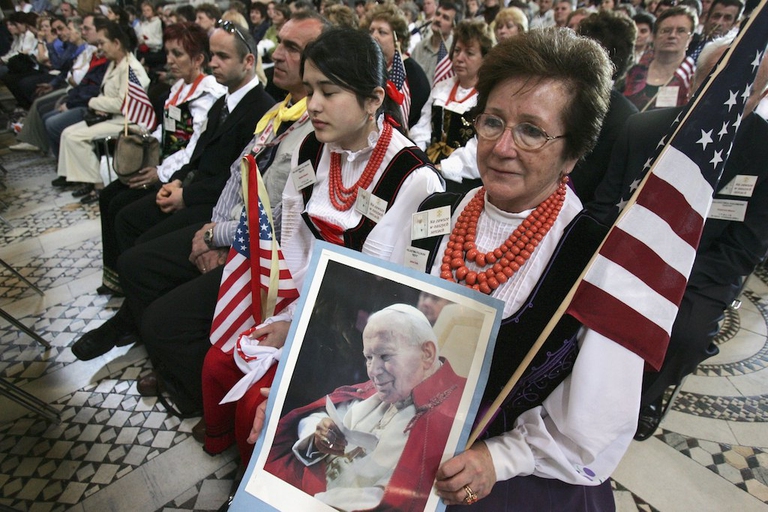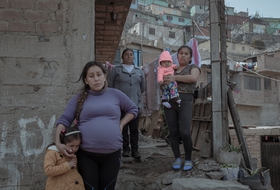
One in three women have suffered physical or sexual violence. With contributions from Europe, Africa, Asia and Latin America, we look at how this shadow pandemic affects every corner of the world.
A bill to liberalise abortion law and partially remove restrictions imposed by Poland’s abortion ban was rejected by its parliament. Instead, it voted to continue working on a proposal to further limit women’s reproductive rights.
New legislation in Poland, introduced under the telling title of “stop abortion”, aims to outlaw pregnancy interruption procedures carried out due to foetal damage, which account for over 95 per cent of all legally performed abortions in the country. “We will strive to ensure that even in pregnancies which are very difficult, when a child is sure to die or is strongly deformed, women end up giving birth so that the child can be baptised, buried, and have a name,” Jarosław Kaczyński, the leader of the ruling Law and Justice party commented.
Ancora donne in piazza a #Varsavia per contrastare il disegno di legge ‘Fermiamo l’Aborto’, fortemente sostenuto da Chiesa e conservatori. Il racconto della prima protesta ► https://t.co/NKzj185fM7 #CzarnyProtest #StrajkKobiet @amnestypl pic.twitter.com/fbTqQLs0iY
— LetteraDonna (@LetteraDonna) 18 gennaio 2018
At the same time, the parliament rejected the draft version of the “save women” bill put forth by a pro-choice grassroots movement, prompting a wave of criticism from civil society. The bill proposed legalisation of abortion until the end of the first trimester and a limited access to abortion following that period. Additionally, the bill aimed to improve other aspects of women’s reproductive health, like access to sex education and emergency contraception.
“Power to the girls”
Check out some of my photos from last night’s #BlackProtest in London. Solidarity with women & girls taking to the streets in Poland
https://t.co/HoqVjpptCB #ratujmykobiety #StrajkKobiet #CzarnyProtest pic.twitter.com/YySMLXxvYU
— Fotis Filippou (@Fotis_Filippou) 18 gennaio 2018
Abortion law in Poland is already one of the most restrictive with regards to women’s reproductive rights. In fact, abortion isn’t legal in most cases, and there are currently only three exceptions. These are, firstly, if women’s health or life are in danger. Secondly, abortion can be performed if there is a severe and irreversible damage to the foetus. Lastly, women are allowed to opt for abortion in cases of rape or incest. Consequently, even though official statistics register about 1,000 abortions annually, non-governmental organisations estimate that each year about 150,000 Polish women terminate pregnancies illegally.
#Polishwomenonstrike pic.twitter.com/UQkQ0hMa6b — Res (@resistenzedoc) 3 ottobre 2016
The strong position of the Catholic church on the Polish political arena additionally challenges the defence of women’s reproductive rights. More than 96 per cent of Poles identify themselves as Roman Catholic. The official stance of the church on women’s rights, gender studies and sex education is perhaps best encapsulated in a pastoral letter from 2013. In the letter, Polish bishops warn against spreading “gender ideology” and implementing sexual education in schools, as they supposedly lead the youth “to become regular customers of pharmaceutical, erotic, pornographic, paedophile and abortion enterprises”. Referred to as “sexual subjugation”, sex education can also be a cause of “other addictions (alcoholism, drug abuse, hazard) and harm inflicted to oneself or others (paedophilia, rapes, domestic violence),” according to the clergy’s message.
Read more: President Duda vetoes judicial reform in Poland threatening courts’ independence
Poland is a signatory to a variety of international conventions that impose the obligation to implement sexual education conveying religiously neutral and scientifically unbiased knowledge. Defying that notion, the core curriculum of “preparation for family life” taught in Poland as a non-compulsory subject since 2009 focuses on so-called “chastity education” and the importance of complying with traditional gender roles.
As well as that, with the Church’s support, since 2014 about 4,000 medical practitioners in Poland have signed the Declaration of Faith that recognises “the primacy of God’s laws over human laws”. The list of signees includes the current Health Minister Łukasz Szumowski. The Declaration proclaims that “if a person acts by their own will to negatively alter conception and bring about death, then he or she not only violates the basic commandments of the Decalogue, committing acts such as abortion, euthanasia, contraception, artificial insemination, and/or in vitro fertilisation, but rejects The Creator as well”.
Under the Polish conscience clause, healthcare providers can refuse to perform certain medical services on the basis of their religious beliefs. The declaration in itself hasn’t brought about any legal changes, yet it has symbolically legitimised stigmatisation of Polish women seeking medical help in the area of reproductive health.
https://youtu.be/TqkslEpgRFs
It isn’t the first attempt to restrict women’s reproductive rights. In October 2016, thousands of Polish women joined the national strike and took to the streets to oppose a bill proposing a blanket ban on abortion, eventually forcing the government to step back. Poles protested under a common slogan of “black protest”, wearing clothes of this colour as a sign of mourning for their reproductive rights.
Read more: Poland, thousands of women are protesting against a proposed abortion ban
“The protest was bigger than anyone expected. People were astonished,” commented activist Agnieszka Graff back in 2016. “Warsaw was swarming with women in black. It was amazing to feel the energy and the anger, the emotional intensity was incredible”.
Wearing black #solidarity #Polishwomenonstrike #CzarnyProtest @EP_GenderEqual @Mariearenaps @TerryReintke @AngelikaMlinar @MalinBjork_EU pic.twitter.com/va98Tymm75
— Julie Ward MEP #FBPE #PCPEU (@julie4nw) 5 ottobre 2016
While the strike didn’t disrupt the economy, the resistance women mounted in 2016 and public debate surrounding it seem to have affected public opinion on reproductive rights. Following the black protests, polls registered an increased support for abortion of about 5-7 per cent. This shows, in turn, that although no one is ready to lay down the weapons in the battle over women’s bodies just yet, Polish society is indeed capable of listening.
Siamo anche su WhatsApp. Segui il canale ufficiale LifeGate per restare aggiornata, aggiornato sulle ultime notizie e sulle nostre attività.
![]()
Quest'opera è distribuita con Licenza Creative Commons Attribuzione - Non commerciale - Non opere derivate 4.0 Internazionale.
One in three women have suffered physical or sexual violence. With contributions from Europe, Africa, Asia and Latin America, we look at how this shadow pandemic affects every corner of the world.
The Istanbul Convention against gender-based and domestic violence marks its tenth anniversary. We look at what it is, who its signatories are, and what the future might hold.
European Commission President Ursula von der Leyen reminded us of the gravity of violence against women around the world, and of the Istanbul Convention’s utmost importance.
President Erdoğan has pulled Turkey out of the Istanbul Convention, key in the fight against gender violence, claiming that it favours the LGBT community rather than family values.
Violence against women in Peru has increased as a result of Covid-19 lockdowns. 14,912 people were reported missing from January to November 2020, more than half of them minors and 64 per cent women. People have been confined to their homes for months, many forced to endure poor physical, economic and social conditions. A situation that
Joys Estefani Qqueccaño Huamani, 24, disappeared from her rural community in Peru on 9 October. Her family began looking for her independently of the authorities and despite the resistance of relatives of Joys Estefani’s ex-partner Arturo Ccana Condori, 32, charged with committing violence against her on 28 September, eleven days before Joys Estefani disappeared. Photos
Costa Rica celebrated its first same-sex marriage when two women, Alexandra Quiros and Dunia Araya, celebrated their wedding: an “extraordinary moment”.
The pandemic and its restrictions are affecting everyone, without exceptions. However factors like housing, income inequalities, gender, access to technology and working conditions are influencing how people experience the health crisis.
Time magazine’s 100 Women of the Year project sheds light on influential women’s stories, from Amelia Earhart to Greta Thunberg. A selection of some of the greats for International Women’s Day.









